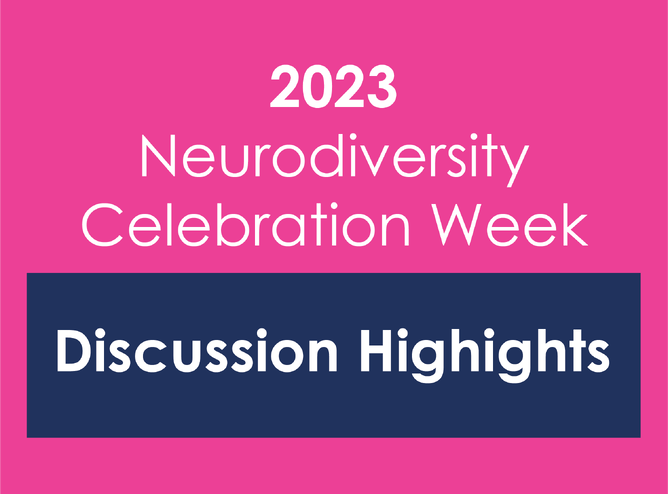Neurodiversity Celebration Week is an annual global event held in March and DivergenThinking hosted New Zealand’s inaugural celebrations this year with a series of top-line discussions with special interest groups from around the country, such as youth, education, construction, and engineering.
Neurodiversity refers to the wide range of brain-wiring differences in individuals and includes conditions such as autism, dyslexia, ADHD, and Tourette Syndrome.
It will come as no surprise that the first session was attended by a diverse group, including Sonia Gray and Sir Peter Leitch, who are both neurodiverse. The discussion highlighted a need for increased awareness of neurodiversity and allowed those who are neurodiverse to share their lived experiences.
Two questions were asked, which framed the discussions.
1) “Why is it important to celebrate Neurodiversity in New Zealand?”
2) “What advice would you give others regarding their Neurodiversity journey?”.
The following 3 themes surfaced during the discussion:
1. Awareness is needed to change the Neurodiversity narrative
The anecdotal experiences discussed indicated a need for increased awareness and understanding of the challenges and support required for neurodiverse children and adults in New Zealand.
The biggest challenge experienced by Neurodiverse individuals is a lack of understanding and flexibility to accommodate specific requirements. For example, a quiet space to work or sponsored noise-canceling headphones.
Insert this text in stylised format:
“A coalition of ADHD New Zealand, Dyslexia Foundation, Autism New Zealand and Centre for Gifted Education, are supporting 15 young neurodiversity champions aged between fifteen and twenty-two and they’re going to parliament demanding that politicians in the lead up to the elections to consider neurodiversity and their education policies.”
Suzanne Cooksen, ADHD New Zealand
Insert this text in stylised format:
“Neurodiversity isn’t the problem, it’s the anxiety and trauma experienced from not fitting in and being told every day, either implicitly or explicitly, that you’re less than. We must instil in dyslexics and all neurodivergent individuals that they have something really special.”
Sonia Gray, Director of the documentary, “Kids Wired Differently”
2. A sense of self early on builds confidence & better outcomes
By embracing Neurodiversity, companies can benefit from increased productivity and creativity, as well as a larger pool of talent. Neurodiversity can also lead to increased innovation, as people with different brain wiring can bring their unique perspectives to the table.
The lived experience recounted in the discussion was that a large number of Neurodivergent people find themselves on the fringes of society as they cannot meet the rigid expectations of today’s job specifications and recruitment processes. This leads the Neurodiverse to either unemployed or under-employed. If they do secure a job they are then expected to excel in all areas and are penalised if they fall short in some areas e.g. administrative tasks or sensory sensitivities that result in low productivity within busy workplaces.
Insert text in stylised format:
“If you don’t have faith in yourself, it’s a battle. I still don’t know my alphabet or times table and I often look in the mirror and say how the hell did I make any money!
But a teacher in college gave me that faith and I don’t think I would be where I am today if it wasn’t for her giving me that confidence.”
Sir Peter Leich, Businessman & Philanthropist
3. Unlocking neurodiverse skills: small accommodations, big economic upside
By embracing Neurodiversity, companies can benefit from increased productivity and creativity, as well as a larger pool of talent. Neurodiversity can also lead to increased innovation, as people with different brain wiring can bring their unique perspectives to the table.
The lived experience recounted in the discussion was that a large number of Neurodivergent people find themselves on the fringes of society as they cannot meet the rigid expectations of today’s job specifications and recruitment processes. This leads the Neurodiverse to either unemployed or underemployed. If they do secure a job they are then expected to excel in all areas and are penalised if they fall short in some areas e.g. administrative tasks or sensory sensitivities that result in low productivity within busy workplaces.
Insert text in stylised format:
“It’s not a big ask for some organisations to change the environment to fit the person and not change the person to fit the environment.”
Anton Ashcroft, Registered Psychologist & Co-founder of DivergenThinking
Insert text in stylised format:
“…they (people labelled with dyspraxia) have so much to give, but we marginalise them and they don’t have a support network to be successful and they become a statistic.”
Jacqui Scott, Manager of the Dyspraxia Support Group, New Zealand
Insert text in stylised format:
“Labelling children lazy or difficult or non-compliant further
isolates and others neurodivergent children and adults.”
Sonia Gray, Director of the documentary, “Kids Wired Differently”
Insert text in stylised format:
To learn how your organisation can maximise the power of neurodiversity to decrease burnout and increase overall well-being and productivity please contact us.

